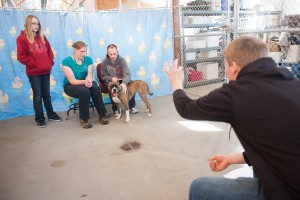Man’s best friend is being tested to see if it can respond to human emotion.
Peggy Gartman, who is pursuing a master’s degree in psychology, is conducting the study on dogs, and it is the first time on BYU campus that a student has conducted cognitive testing on dogs for her master’s thesis.

“What we’re doing is we are trying to find out if dogs use emotion in conjunction with referential pointing,” Gartman said. “Referential learning is when you use another person’s reactions as a reference in responding to unknown situations.”
Gartman said dogs are held about 10 feet away from two covered food bowls. A lab assistant will motion to one of the food bowls and see if the dog goes to the one to which the point is directed, which has food in it. Next, the assistant will pair the pointing with either a happy face and voice or an unhappy face and voice to see if this will affect where the dog goes. In the positive condition, food is placed in the bowl that is being pointed to, while in the negative condition, the food is in the bowl that is not being pointed to.
Ross Flom, an associate professor of psychology, is Gartman’s adviser for the study.
“One, we are looking to see if dogs respond to pointing,” Flom said. “Two, we want to know whether if we pair an emotion with a point, does that influence their ability to follow your point. They don’t understand what we say, but they may understand the affect of it.”
Flom said in the neutral and positive condition, it is assumed that the dog would follow a point. While in the negative, they predicted the dog would go to the opposite bowl.
Several undergraduates will also assist with the study.
Darren Guenther, a freshman and psychology major from Chilliwack, British Columbia, is excited to take part in the experiment.
“I’m really excited to learn how dogs are able to communicate with us,” Guenther said. “A lot of people have dogs as pets. It will be good to see how well they read our cues.”
Gartman said many studies of a similar type have been done on infants and apes, but not too many on dogs.
“Because dogs have lived with humans for approximately 10-14,000 years, there is good reason to believe they are sensitive to our communicative behaviors,” Gartman said.

According to Flom, canine cognition is a growing area of study and dogs respond surprisingly well because of the extensive time they have spent with humans over the course of domestication.
“We tend to want dogs around us that are good and responsive to our cues, and dogs tend to want to be around us when we are responsive their cues,” Flom said. “Is a snarling dog one that we want to approach or a dog with its tail wagging? They’re pretty good at reading our cues too.”
The dogs used in the study come from owners in the community who volunteered them.
“They’re not housed here. They don’t live here,” Flom said. “If you want to have your dog participate in a study, we would love to have your dog. We give them a little bag of dog treats, and the dogs get pretty much all the treats they can stomach and all they can eat while they are here. So the dogs come happy and leave with full bellies.”
To volunteer a dog for the study, owners can call (801) 422.8588 or email Gartman at .




